Department of Chemistry Facilities
The Department of Chemistry is housed in Turner Hall allowing eight research laboratories and
eight teaching laboratories for the department.
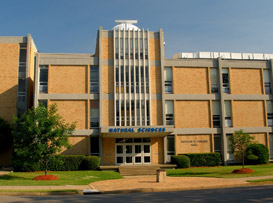

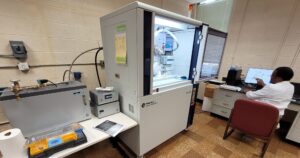
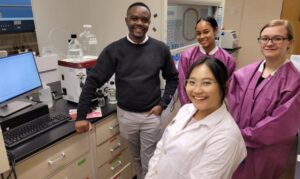
Dr. Chakafana works with Dr. Poolsawat from Mahidol University, Thailand, a Virginia Governor’s School of Science and Technology Student, and a Hampton University Biochemistry Student in the Biochemistry Research Laboratory on High Pressure Liquid Chromatography (HPLC) for a research project.

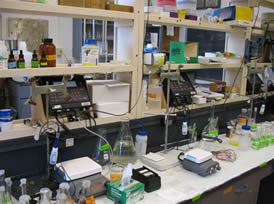
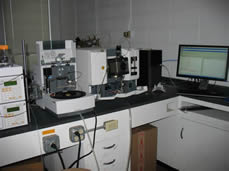
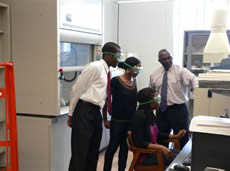
Major Instrumentation and equipment include:
- Xta Synergy Rigaku Single Crystal X-ray diffractometer which uses CrysAlis Pro data processing software
- Cary 60 BIO UV-VIS Spectrometer with Dell Optiplex 745 workstation
- Cary 50 BIO UV-VIS Spectrometer with Dell Optiplex 745 workstation
- Cole Parmer dual chamber digital flame photometer
- Varian ICP-OES 720: Inductively coupled plasma (ICP) optical emission spectroscopy (OES)
- Varian MS TURBODDS Mass Spectrometer
- Agilent High Performance Liquid Chromatograph Series 1100 with DAD
- Beckman 640B UV-VIS Spectrometer
- HP 3D Capillary Electrophoresis and Series 1100 Mass Spectrometer with Kayak workstation
- Metrohm Ion Chromatograph 861 with Dell Optiplex GX 270 Workstation
- Shimadzu Gas Chromatograph GC-17A FID/ECD and MPC workstation
- Varian FTIR 1000 Scimitar Series with Dell Optiplex 755 Workstation
- Varian Graphite Furnace Atomic Absorption Spectrometer SPECTRA AA220 with GTA 110 and Dell workstation
- 400 MHz JEOL Nuclear Magnetic Resonance Spectrometer with Autosampler and Dell Precision 390 Workstation and APC UPS 3000XL.
- TA instruments TGA 2050 Thermagravimetric Analyzer with DSC 2920
- BAS Electrochemistry workstation to include Rotating Disc Electrode RDE 2 with cell and Dell Dimension workstation
- Shimadzu Spectrofluorometer RF-5301PC
- Beckman Coulter Allegra x-22 Centrifuge
- Beckman Coulter TLX Refrigerated Ultracentrifuge
- VWR Shaker 5000IR with multiple platforms
- Inova Low Temperature Freezer
- FotoDyne Convertible Camera Station
- GeneAmp 9700 PCR system
- Jasco Fourier Transform Infrared FTIR 4200 with IRT-3000 IR Microscope and Optiplex 755 Workstation
- Leica CME Microscope (2)
- VWR Vistavision Microscope with camera
- Inova Low-Temperature Freezer
- Anton Paar Rheolab QC Rheometer
- Form Labs Stereolithography 3-D Printer
- Nanalysis 100 mHz NMR
- Agilent Cary 630 Benchtop FTIR with Diamond ATR
- Agilent 240 Fast Sequential Atomic Absorption Spectrometer
- Genesys 30 Spectrophotometer
- Multiskan FC Plate Reader
- Mel-Temp Melting Point Apparatus
- Norlake Flammable Material Storage
- Buchi Rotavapr R-300
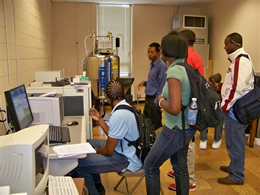
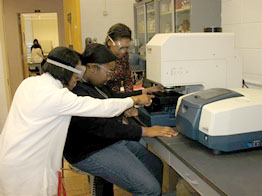
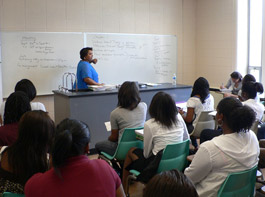
Dr. Waddell gives an organic chemistry lecture.
Computer Facilities
The Chemistry Department maintains several computer facilities in Turner Hall.
- The general purpose use facility (Student Learning Center) is outfitted with 13 Dell Optiplex computers (GX 270)
- The high performance computing facility (Computational Chemistry Laboratory) is outfitted with 20 Dell Optiplex computers (GX 620)
In addition there is a Mobile Student Learning Center outfitted with 15 Dell Inspirons and Latitudes, a CHEM PQS Server for Computational Chemistry and a Dell Optiplex 755 provides for NMR Data Storage with network access.
Small-scale Microwave-assisted Organic Laboratory (SMOL): Facility and equipment
The microwave assisted organic chemistry laboratory is outfitted with three different models of microwave reactors to include-
- The CEM Mars 6 multi-mode reactor.
- The CEM Discover SP-Ds, mono-mode reactor.
- One Discover SP-D, outfitted with Cool-mate, for sub-ambient temperature
- The Anton Paar Monowave 300.
Each of the models was chosen based on specific features like the ability to handle larger sample sizes or obtain higher temperatures by using special sample vessels.

